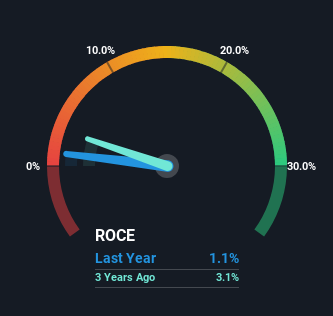- United States
- /
- Airlines
- /
- NasdaqGS:SKYW
SkyWest (NASDAQ:SKYW) Will Be Hoping To Turn Its Returns On Capital Around
What financial metrics can indicate to us that a company is maturing or even in decline? Businesses in decline often have two underlying trends, firstly, a declining return on capital employed (ROCE) and a declining base of capital employed. Trends like this ultimately mean the business is reducing its investments and also earning less on what it has invested. In light of that, from a first glance at SkyWest (NASDAQ:SKYW), we've spotted some signs that it could be struggling, so let's investigate.
Return On Capital Employed (ROCE): What Is It?
Just to clarify if you're unsure, ROCE is a metric for evaluating how much pre-tax income (in percentage terms) a company earns on the capital invested in its business. Analysts use this formula to calculate it for SkyWest:
Return on Capital Employed = Earnings Before Interest and Tax (EBIT) ÷ (Total Assets - Current Liabilities)
0.011 = US$68m ÷ (US$7.1b - US$1.2b) (Based on the trailing twelve months to June 2023).
Thus, SkyWest has an ROCE of 1.1%. Ultimately, that's a low return and it under-performs the Airlines industry average of 8.2%.
See our latest analysis for SkyWest

Above you can see how the current ROCE for SkyWest compares to its prior returns on capital, but there's only so much you can tell from the past. If you're interested, you can view the analysts predictions in our free report on analyst forecasts for the company.
What Does the ROCE Trend For SkyWest Tell Us?
There is reason to be cautious about SkyWest, given the returns are trending downwards. Unfortunately the returns on capital have diminished from the 8.3% that they were earning five years ago. On top of that, it's worth noting that the amount of capital employed within the business has remained relatively steady. Since returns are falling and the business has the same amount of assets employed, this can suggest it's a mature business that hasn't had much growth in the last five years. If these trends continue, we wouldn't expect SkyWest to turn into a multi-bagger.
The Bottom Line On SkyWest's ROCE
In summary, it's unfortunate that SkyWest is generating lower returns from the same amount of capital. Long term shareholders who've owned the stock over the last five years have experienced a 34% depreciation in their investment, so it appears the market might not like these trends either. With underlying trends that aren't great in these areas, we'd consider looking elsewhere.
On a final note, we've found 1 warning sign for SkyWest that we think you should be aware of.
While SkyWest isn't earning the highest return, check out this free list of companies that are earning high returns on equity with solid balance sheets.
New: Manage All Your Stock Portfolios in One Place
We've created the ultimate portfolio companion for stock investors, and it's free.
• Connect an unlimited number of Portfolios and see your total in one currency
• Be alerted to new Warning Signs or Risks via email or mobile
• Track the Fair Value of your stocks
Have feedback on this article? Concerned about the content? Get in touch with us directly. Alternatively, email editorial-team (at) simplywallst.com.
This article by Simply Wall St is general in nature. We provide commentary based on historical data and analyst forecasts only using an unbiased methodology and our articles are not intended to be financial advice. It does not constitute a recommendation to buy or sell any stock, and does not take account of your objectives, or your financial situation. We aim to bring you long-term focused analysis driven by fundamental data. Note that our analysis may not factor in the latest price-sensitive company announcements or qualitative material. Simply Wall St has no position in any stocks mentioned.
About NasdaqGS:SKYW
SkyWest
Through its subsidiaries, engages in the operation of a regional airline in the United States.
Undervalued with solid track record.
Similar Companies
Market Insights
Community Narratives



